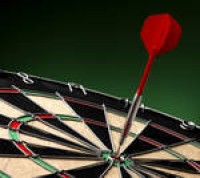
The Three Phases of Play
Posted: 10.09.11 in Darts Performance Centre Blog category
The first of a series of articles that explain how we look at darts
Welcome to The Darts Performance Centre Darts Blog
Darts does not need sports science! It is a straight-forward game; you throw a dart at a board a few metres away and add up your score and write it on a board, simple!
However, when you take the time to consider this you realise that all sports are simple. The most popular involve getting a ball over, in or through a net, in a hole, or touched down or over a line on the pitch. All these sports have embraced sports science methods to the benefit of the participants, not only the elite players but anyone who takes part no matter what their age or standard. For example children under the supervision of a FA qualified coach are encouraged to set goals and targets, as are all tennis players. Golfers of all ages and standards spend substantial amounts of money on training aids with some sort of scientific method utilised to make them effective and saleable.
In general sports science has been ignored by darts. Maybe it is because dart players need proof that sports science can help them. Theory is great, but does it work when you are up on the oche or practising? To give players an idea of how looking at darts from a “scientific “viewpoint could help, we have taken a look at how, in general, a darts match is broken down. It is generally accepted and it has been discussed before that a leg of darts is split into three distinct phases. Some players still mastering the game may argue that phase 1 and 2 could, for them anyway, join forces in a sort of darting coalition. Nevertheless, the principles we will discuss remain the same.
The Three Phases of Play
Phase 1 The first 9 darts thrown
Phase 2 Preparing for a checkout by reaching a score of 170 or below (being aware of bogeynumbers). The majority of checkouts happen, even with elite players (75% in last year’s Premier League) are in the “checkout zone” this is when they require 80 points or fewer.
Phase 3 Checking out by hitting any one of the doubles.
There are a number of benefits for players by breaking down and separating into separate phases the process involved in winning a leg of darts. For the benefit of this article we will focus on the scenario of a player struggling in the third phase of the game, a common occurrence. Whether you regularly complete a bull finish or invariably end up “in the madhouse” this is the phase of the game where it surely cannot be disputed that sports science can help? A player who is struggling with his doubles has lots of help; they just need the right advice.
From an analytical viewpoint we would be interested to know at what point of the game the problems start. For example, is there a significant dip in form when a player is going for a double to win a match and their opponent is also on a finish, as opposed to being a long way behind in the scoring,? It would be helpful to know at what point the anxiety of successfully hitting the double starts. One reason for this is that players could develop an early warning system of feelings of stress and anxiety if they were aware of when they are most likely to suffer from the symptoms.
We would encourage players to practice relaxation techniques and breathing exercises that promote a feeling of calm. Self talk could also assist. Players could work out key words to remind them to carry out the relaxation exercises and breathing techniques when they are closing in on a finish, these trigger words can be practised until they are a normal part of a player’s game. Relaxing the mind by thinking of something that is seemingly un-related to popping a dart into a double segment can also help. A player we work with uses Eric Cantona as his inspiration, but what he does is our secret! If whatever you do makes you smile and relax then that is the same outcome that any more conventional intervention desires, and thinking about King Eric is much more fun!
Finally of course there is practice. We have created a checkout game at the dartsperformancecentre.com where players can keep track of their progress in completing a variety of checkout scores. The feedback that keeping track of your progress produces is vital, it is impossible to improve without feedback.
Do these suggestions sound like a foreign language? Actually, most of them are fairly easy to master; they unfortunately need patience, commitment and practice. Just like mastering darts really, patience, commitment, practice and some sports science, simple!
copyright: Paul Gillings 2010 No reproduction without written consent
..............................................................................................................................................
The Darts Performance Centre is a resource to assist dart players of all standards play better darts. The site is arranged as an on-line coaching manual. There is advice on technique, nerves, psychology, goal setting, practice games, an area to log your statistics and an interactive area where your darting questions are answered by two sports scientists, one with 30 years dart playing experience! Membership is just £25.00 per annum.
Author:
Paul Gillings (
paul@dartsperformancecentre.com )
Post by Category
Posts by Month
- November 2025
- October 2025
- September 2025
- August 2025
- July 2025
- June 2025
- May 2025
- April 2025
- March 2025
- February 2025
- January 2025
- December 2024
- December 2024
- November 2024
- October 2024
- September 2024
- August 2024
- July 2024
- June 2024
- May 2024
- April 2024
- March 2024
- February 2024
- January 2024
- December 2023
- December 2023
- November 2023
- October 2023
- September 2023
- August 2023
- July 2023
- June 2023
- May 2023
- April 2023
- March 2023
- February 2023
- January 2023
- December 2022
- December 2022
- November 2022
- October 2022
- September 2022
- August 2022
- July 2022
- June 2022
- May 2022
- April 2022
- March 2022
- February 2022
- January 2022
- December 2021
- December 2021
- November 2021
- October 2021
- September 2021
- August 2021
- July 2021
- June 2021
- May 2021
- April 2021
- March 2021
- February 2021
- January 2021
- December 2020
- December 2020
- November 2020
- October 2020
- September 2020
- August 2020
- July 2020
- June 2020
- May 2020
- April 2020
- March 2020
- February 2020
- January 2020
- December 2019
- December 2019
- November 2019
- October 2019
- September 2019
- August 2019
- July 2019
- June 2019
- May 2019
- April 2019
- March 2019
- February 2019
- January 2019
- December 2018
- December 2018
- November 2018
- October 2018
- September 2018
- August 2018
- July 2018
- June 2018
- May 2018
- April 2018
- March 2018
- February 2018
- January 2018
- December 2017
- December 2017
- November 2017
- October 2017
- September 2017
- August 2017
- July 2017
- June 2017
- May 2017
- April 2017
- March 2017
- February 2017
- January 2017
- December 2016
- December 2016
- November 2016
- October 2016
- September 2016
- August 2016
- July 2016
- June 2016
- May 2016
- April 2016
- March 2016
- February 2016
- January 2016
- December 2015
- December 2015
- November 2015
- October 2015
- September 2015
- August 2015
- July 2015
- June 2015
- May 2015
- April 2015
- March 2015
- February 2015
- January 2015
- December 2014
- December 2014
- November 2014
- October 2014
- September 2014
- August 2014
- July 2014
- June 2014
- May 2014
- April 2014
- March 2014
- February 2014
- January 2014
- December 2013
- December 2013
- November 2013
- October 2013
- September 2013
- August 2013
- July 2013
- June 2013
- May 2013
- April 2013
- March 2013
- February 2013
- January 2013
- December 2012
- December 2012
- November 2012
- October 2012
- September 2012
- August 2012
- July 2012
- June 2012
- May 2012
- April 2012
- March 2012
- February 2012
- January 2012
- December 2011
- December 2011
- November 2011
- October 2011
- September 2011
- August 2011
- July 2011
- June 2011
- May 2011
- April 2011
- March 2011
- February 2011
- January 2011
- December 2010
- December 2010
- November 2010
Main Index







.jpg)


